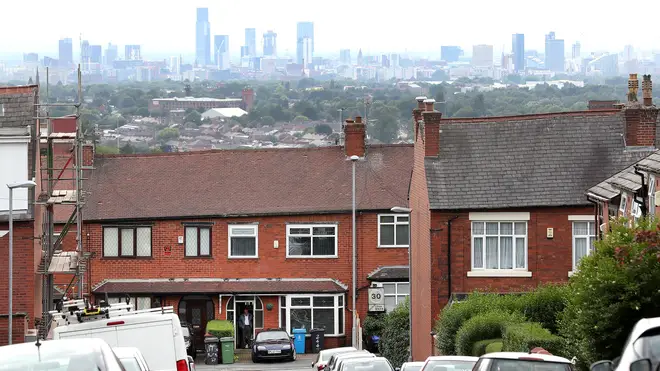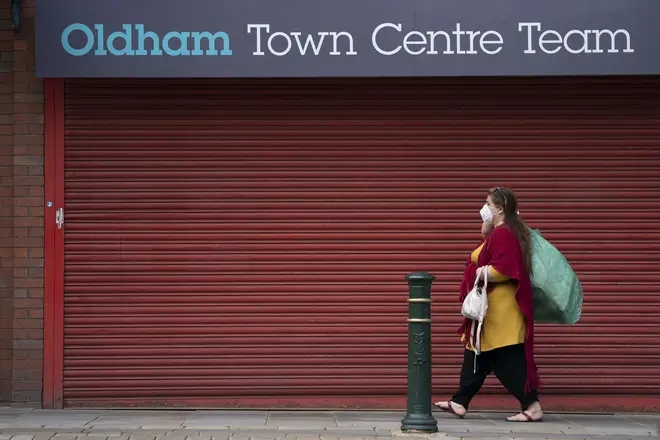
Nick Abbot 10pm - 1am
7 August 2020, 16:45

Preston has been announced as the latest UK city to be placed under local lockdown following a spike in Covid-19 cases.
This means that the restrictions that apply to other parts of east Lancashire, Greater Manchester and west Yorkshire will now also apply to Preston.
It follows Preston being designated an "area of intervention" by government following a spike in cases.
From midnight tonight, people living in Preston cannot have others in their homes and gardens and cannot visit other people's homes or gardens, even if they are in an unaffected area.
People living in Preston will also not be permitted to mix with other household in indoor venues.
Social bubbles will be exempt from these restrictions.
Preston residents can still meet in groups of up to six, or more than six if exclusively from two households, in outdoor areas such as parks and beer gardens.
Households can also visit indoor hospitality venues, so long as they don't mix with other households.

The rolling seven-day rate of new cases of Covid-19 in Preston has risen from 20.3 cases per 100,000 people in the seven days to July 27 to 32.8 in the seven days to August 3.
Measures banning mixing between households in the former areas were due for review on Thursday - a week after they were brought in for residents.
Restrictions in Blackburn with Darwen has seen the rate of infection fall from 88.8 cases per 100,000 people to 82.2, with 123 new cases in the past week.
The Greater Manchester borough of Oldham is in second place, where the seven-day rate has jumped from 55.7 to 67.9, with 161 new cases, while Pendle in Lancashire is third, where the rate has risen from 46.7 to 58.6, with 54 new cases.
The rate in Leicester continues to fall, down from 62.4 to 52.2, with 185 new cases.
Preston City Council chief executive Adrian Phillips said: "The number of cases in Preston have increased rapidly in recent days leading to Government categorising the city as an area of intervention. It is also alarming to see that the under-30s are contracting it at a significant rate.
"It is clear that coronavirus is still here and we all need to work together to keep ourselves, our friends, families and communities safe from this virus.
"While some wards have recorded a higher level of cases, this remains a city-wide issue and it's essential that we all do our part to fight the virus.
"We're urging everyone to be diligent and follow the restrictions, in order to protect all of our residents, communities and businesses."

Why were the govt so slow to react to Leicester's Covid-19 outbreak?
It follows the announcement that the UK's R number has slightly risen towards the crucial figure of 1 in the past week.
The rate of infection now stands at 0.8 to 1.0, up from 0.8 to 0.9 last week, the Government's Scientific Advisory Committee for Emergencies (Sage) said.
Regionally, it increased in Scotland, Wales, Northern Ireland, London, the northeast and Yorkshire, and the Midlands.However, England's level as a whole stayed the same at 0.8 to 1.0.
In more positive news, data from the Office for National Statistics (ONS) shows an average of 3,700 people per day in private households in England were estimated to be newly infected with Covid-19 between 27 July and 2 August - down slightly from 4,200 per day in the previous week.
A total of 28,300 people in private households in England had Covid-19 between July 27 and August 2, according to new estimates, which is the equivalent of about 0.05% of the population - or one in 1,900 individuals.
The figures do not include people staying in hospitals, care homes or other institutional settings.
The ONS said that while recent figures suggested the percentage of individuals testing positive for Covid-19 had risen since the end of June, there is now evidence to suggest this trend may have levelled off.
Meanwhile, quarantine measures were announced on Thursday evening for travellers arriving into the UK from Belgium, Andorra and The Bahamas - with Britons advised against all but essential travel to the three countries.
The restrictions - which mean those arriving will have to self-isolate for 14 days - came into force at midnight in Wales, with the same rules applying in England, Scotland and Northern Ireland from 4am on Saturday.
Reports suggest that France could be next to face restrictions due to rising infections in the country.
The French health authority - Sante Publique France - reported cases of Covid-19 are up by a third (33%) in the week to August 6, and infection rates are increasing in all age groups, particularly 20 to 30-year-olds.
Chancellor Rishi Sunak said on Friday that ministers will "not hesitate" in ordering travellers coming back from countries with high Covid-19 rates to isolate for the two-week period.
He told reporters: "It's a tricky situation. What I can say to people is we're in the midst of a global pandemic and that means there is always the risk of disruption to travel plans and people need to bear that in mind.
"It's the right thing for us to do to keep everything under review on a constant basis talking with our scientists, our medical advisers, and if we need to take action as you've seen overnight we will of course not hesitate to do that and we're doing that to protect people's health."